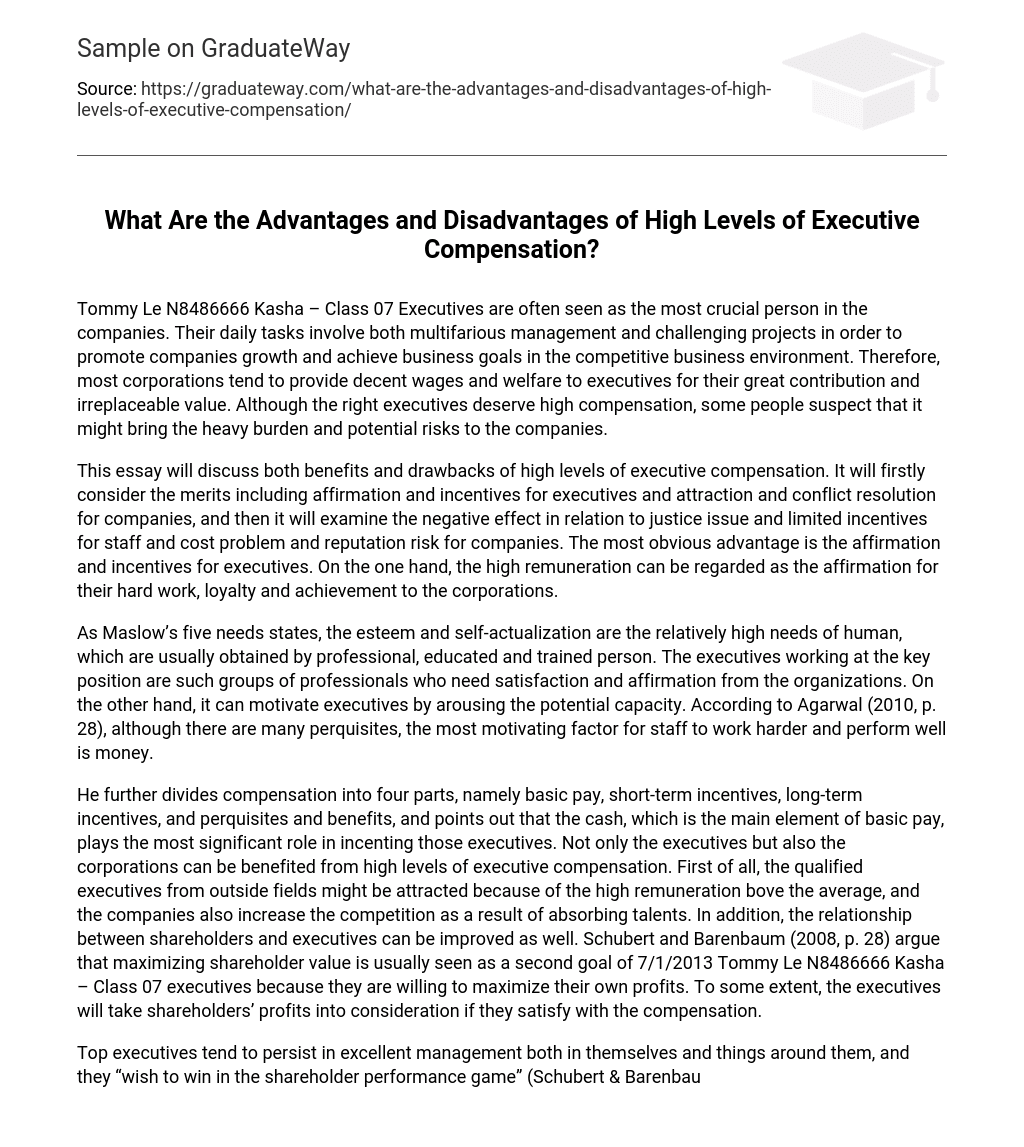Executives are often seen as the most crucial person in the companies. Their daily tasks involve both multifarious management and challenging projects in order to promote companies growth and achieve business goals in the competitive business environment. Therefore, most corporations tend to provide decent wages and welfare to executives for their great contribution and irreplaceable value. Although the right executives deserve high compensation, some people suspect that it might bring the heavy burden and potential risks to the companies.
This essay will discuss both benefits and drawbacks of high levels of executive compensation. It will firstly consider the merits including affirmation and incentives for executives and attraction and conflict resolution for companies, and then it will examine the negative effect in relation to justice issue and limited incentives for staff and cost problem and reputation risk for companies. The most obvious advantage is the affirmation and incentives for executives. On the one hand, the high remuneration can be regarded as the affirmation for their hard work, loyalty and achievement to the corporations.
As Maslow’s five needs states, the esteem and self-actualization are the relatively high needs of human, which are usually obtained by professional, educated and trained person. The executives working at the key position are such groups of professionals who need satisfaction and affirmation from the organizations. On the other hand, it can motivate executives by arousing the potential capacity. According to Agarwal (2010, p. 28), although there are many perquisites, the most motivating factor for staff to work harder and perform well is money.
He further divides compensation into four parts, namely basic pay, short-term incentives, long-term incentives, and perquisites and benefits, and points out that the cash, which is the main element of basic pay, plays the most significant role in incenting those executives. Not only the executives but also the corporations can be benefited from high levels of executive compensation. First of all, the qualified executives from outside fields might be attracted because of the high remuneration bove the average, and the companies also increase the competition as a result of absorbing talents.
In addition, the relationship between shareholders and executives can be improved as well. Schubert and Barenbaum (2008, p. 28) argue that maximizing shareholder value is usually seen as a second goal of 7/1/2013 Tommy Le N8486666 Kasha – Class 07 executives because they are willing to maximize their own profits. To some extent, the executives will take shareholders’ profits into consideration if they satisfy with the compensation.
Top executives tend to persist in excellent management both in themselves and things around them, and they “wish to win in the shareholder performance game” (Schubert & Barenbaum, 2008, p. 28). Finally, high compensation is a mean to mitigate agency conflicts between shareholders and managers. As Feng, Ghosh, He, & Sirmans (2010, pp. 446–479) mentioned, high remuneration associated with the performance is effective in aligning executives’ interests with shareholders’, and they would like to join hand to pursue the same goal. However, high levels of executive compensation are not always beneficial to the staff.
In spite of incentives, the issue of distributive justice may exist in most of companies. According to Harris (2009, p. 150), the public view that executive pay packages seem grossly high, and the gap between managers and other corporate employees is increasing. Similarly, Welsh, Ganegoda, Arvey, Wiley & Budd (2012, pp. 262-263) consider that staff perceive their employment world as relatively “just” or “unjust” by comparing with other colleagues, and those of employees might discontent with the unfair compensation distribution.
Furthermore, the corporations may meet the awkward problem that there is limited space for further incentives. The professionals, especially top executives, need inner satisfaction from their day-to-day activities rather than money. Sometimes, they can be motivated extremely by providing them with challenging projects and the autonomous right to manage their work (Robbins as cited in Agarwal, 2010, p. 30). The high levels of executive compensation may also bring potential risks to the companies.
Executive compensation is a business expense, as Lawler (2009, p. 2) emphasizes, if the cost of executive compensation is out of control, those companies will reduce corporate earnings accordingly. It is such a heavy financial burden for the companies especially during the economic crisis. When serious crisis happens, companies will encounter such a dilemma: if the companies decrease the compensation, they cannot retain the key executives; if the companies remain the same levels of compensation, they may suffer from capital shortage, and even.
Moreover, the corporate reputation can be impacted by high executive compensation. Lawler (2009, p. 39) asserts that if executives are paid much but perform poorly, it will result in a negative impression of the effectiveness of companies and reduce the credibility of executives among the public. In conclusion, this essay has analyzed both the advantages and disadvantages of high levels of executive compensation.
For the executives, high compensation brings affirmation and incentives for their performance and achievement; however, the issue of distributive justice and limitation for further incentives cannot be ignored. For the companies, high compensation may attract more outstanding employees and mitigate agency conflict, but it is also blamed for the financial crisis and negative impression. Therefore, despite the positive effects of high levels of executive compensation, both executives and companies need more reasonable and competitive compensation to keep business improving rather than quite high one.





